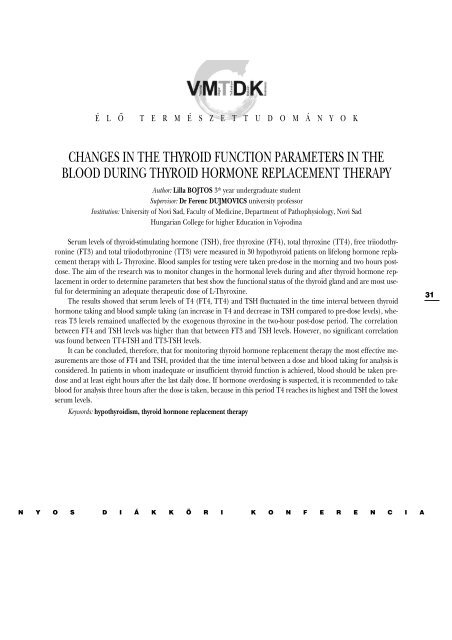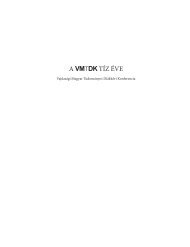Rezümékötet 2008. - vmtdk
Rezümékötet 2008. - vmtdk
Rezümékötet 2008. - vmtdk
Create successful ePaper yourself
Turn your PDF publications into a flip-book with our unique Google optimized e-Paper software.
É L Õ T E R M É S Z E T T U D O M Á N Y O K<br />
CHANGES IN THE THYROID FUNCTION PARAMETERS IN THE<br />
BLOOD DURING THYROID HORMONE REPLACEMENT THERAPY<br />
Author: Lilla BOJTOS 3 th year undergraduate student<br />
Supervisor: Dr Ferenc DUJMOVICS university professor<br />
Institution: University of Novi Sad, Faculty of Medicine, Department of Pathophysiology, Novi Sad<br />
Hungarian College for higher Education in Vojvodina<br />
Serum levels of thyroid-stimulating hormone (TSH), free thyroxine (FT4), total thyroxine (TT4), free triiodothyronine<br />
(FT3) and total triiodothyronine (TT3) were measured in 30 hypothyroid patients on lifelong hormone replacement<br />
therapy with L- Thyroxine. Blood samples for testing were taken pre-dose in the morning and two hours postdose.<br />
The aim of the research was to monitor changes in the hormonal levels during and after thyroid hormone replacement<br />
in order to determine parameters that best show the functional status of the thyroid gland and are most useful<br />
for determining an adequate therapeutic dose of L-Thyroxine.<br />
The results showed that serum levels of T4 (FT4, TT4) and TSH fluctuated in the time interval between thyroid<br />
hormone taking and blood sample taking (an increase in T4 and decrease in TSH compared to pre-dose levels), whereas<br />
T3 levels remained unaffected by the exogenous thyroxine in the two-hour post-dose period. The correlation<br />
between FT4 and TSH levels was higher than that between FT3 and TSH levels. However, no significant correlation<br />
was found between TT4-TSH and TT3-TSH levels.<br />
It can be concluded, therefore, that for monitoring thyroid hormone replacement therapy the most effective measurements<br />
are those of FT4 and TSH, provided that the time interval between a dose and blood taking for analysis is<br />
considered. In patients in whom inadequate or insufficient thyroid function is achieved, blood should be taken predose<br />
and at least eight hours after the last daily dose. If hormone overdosing is suspected, it is recommended to take<br />
blood for analysis three hours after the dose is taken, because in this period T4 reaches its highest and TSH the lowest<br />
serum levels.<br />
Keywords: hypothyroidism, thyroid hormone replacement therapy<br />
N Y O S D I Á K K Ö R I K O N F E R E N C I A<br />
31




